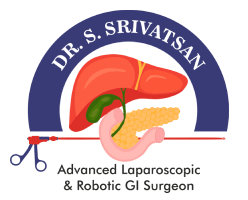- +919677231111 Call Us Now
- drsrivatsan@gmail.com Drop Us a Line
Bile Duct Disorders
Dr. S. Srivatsan provide bile duct disorder treatment in chennai. Bile Duct Disorders are diseases that affect the bile ducts, which are responsible for transporting bile from the liver to the gallbladder and small intestine. There are many different types of Bile Duct Disorders, and they can range from mild to life-threatening.
So if you or someone you know has been diagnosed with a Bile Duct Disorder, here you will find very useful information. We’ll be discussing everything from the symptoms to the treatment options.

Type Of Bile-Duct Disorders:
Bile Duct Stones:
Cholelithiasis, more commonly known as bile-duct stones, is a medical condition that results when a calculus, or stone, forms in the bile duct. Symptoms of cholelithiasis can include pain in the upper-right quadrant of the abdomen, jaundice, and fever. If the stones are large enough, they can cause a blockage of the bile duct, resulting in severe pain, liver failure, and even death.
Bile-duct stones are caused by the precipitation of cholesterol, bilirubin, or calcium salts in the bile. Risk factors for the development of stones include obesity, diabetes, pregnancy, and cirrhosis of the liver. Stones can be removed through a procedure known as lithotripsy, in which the stones are broken up with sound waves. If the stones are too large to be broken up with lithotripsy, they may need to be removed surgically.
Bile Duct Narrowing (Strictures):
Bile duct narrowing, also known as bile duct stricture, is a condition that can occur when the bile duct becomes narrowed and difficult to pass through. This can cause a backup of bile in the liver, leading to inflammation, damage, and scarring.
Bile duct narrowing can be a result of many different things, including infection, trauma, tumor, or any other condition that causes damage to the duct. In most cases, the cause is unknown.
Symptoms of bile duct narrowing can include jaundice, itching, dark urine, and light-colored stools. If left untreated, this condition can lead to liver damage, cirrhosis, and even death.
Treatment for bile duct narrowing typically involves surgery to remove the obstruction and repair the duct. In some cases, a stent may be placed to help keep the duct open.
Bile Duct Cancers:
Bile duct cancers are relatively rare, accounting for only about 3 percent of all cancers in India. However, they are highly deadly, with a five-year survival rate of only about 7 percent.
There are two main types of bile duct cancer: cholangiocarcinoma, which arises from the cells that line the bile ducts, and hepatoblastoma, which is cancer that begins in the liver cells.
Bile duct cancers can cause a wide variety of symptoms, including jaundice, itchy skin, weight loss, fever, and abdominal pain. In some cases, cancer may be detected early, when it is still confined to the bile ducts. In other cases, cancer has spread to other parts of the body by the time it is diagnosed.
There is no definitive treatment for bile duct cancer. Treatment options may include surgery, radiation therapy, chemotherapy, or a combination of these treatments.
If you are experiencing any of the symptoms of bile duct cancer, it is important to see a doctor right away. Early diagnosis and treatment are crucial for the best possible outcome.
Symptoms Of Bile Duct Diseases:
Bile duct disorders often present with non-specific symptoms that can make diagnosis challenging. Some of the common signs and symptoms include:
- Jaundice: Yellowing of the skin and eyes due to the buildup of bilirubin, a component of bile.
- Abdominal pain: Often in the upper right part of the abdomen.
- Dark urine: Caused by excessive bilirubin in the blood.
- Pale stools: Due to lack of bile reaching the intestines.
- Itching: A common symptom in bile duct disorders, particularly when bile is not properly draining.
- Nausea and vomiting: Particularly when bile flow is obstructed.
- Unexplained weight loss: Especially concerning in cases of bile duct cancer.
If you experience any of these symptoms, it is essential to seek medical advice from an expert like Dr. Srivatsan Gurumurthy, who can provide an accurate diagnosis and appropriate treatment.
Diagnosis Of Bile Duct Diseases:
Dr. Srivatsan Gurumurthy offers a range of advanced diagnostic tools to assess bile duct disorders and determine the most effective treatment. Some of the common diagnostic procedures include:
1. Ultrasound: A non-invasive imaging technique that helps visualize the bile ducts and detect any abnormalities such as stones, strictures, or tumors.
2. Magnetic Resonance Cholangiopancreatography (MRCP): MRCP is a specialized MRI scan that provides detailed images of the bile ducts, gallbladder, pancreas, and liver. It is a valuable tool for diagnosing bile duct disorders without requiring invasive procedures.
3. Endoscopic Retrograde Cholangiopancreatography (ERCP): ERCP is both a diagnostic and therapeutic procedure that involves inserting an endoscope through the mouth and into the bile ducts. It allows the doctor to visualize the bile ducts, remove stones, take biopsies, and place stents to open up blocked ducts.
4. Liver Function Tests: Blood tests that measure liver enzymes and bilirubin levels to assess how well the liver and bile ducts are functioning.
5. Biopsy: In cases where cancer is suspected, a biopsy may be performed to collect a small tissue sample from the bile duct for further examination under a microscope.
Treatments for Bile Duct Diseases:
Treatment for bile duct disorders depends on the specific condition and its severity. Dr. Srivatsan Gurumurthy offers a range of treatment options:
1. Medication
- Antibiotics: Prescribed for infections like cholangitis.
- Bile Acids: Medications that may help improve bile flow in certain cholestatic conditions.
2. Endoscopic Procedures
- ERCP: As mentioned, this procedure can remove stones, place stents to relieve blockages, and even obtain biopsies.
- Endoscopic Sphincterotomy: A procedure performed during ERCP to cut the sphincter muscle and facilitate bile flow.
3. Surgical Interventions
In cases where non-invasive treatments are ineffective, surgery may be necessary:
- Bile Duct Exploration: Surgical exploration of the bile ducts to remove stones or address strictures.
- Biliary Reconstruction: Surgical procedures to repair or reconstruct damaged bile ducts, often required in cases of strictures or cancer.
- Liver Resection: Removal of a portion of the liver may be necessary in cases of bile duct cancer.
In advanced cases of bile duct disorders, particularly those involving cancer or severe liver damage, liver transplantation may be considered. Dr. Srivatsan Gurumurthy has extensive experience in liver transplant surgery, providing patients with hope for a better quality of life.
What is the Cost of Bile Duct Disorders Treatment in Chennai?
The cost of bile duct disorder treatment in Chennai, under the care of Dr. Srivatsan Gurumurthy, can vary depending on factors like the specific disorder, treatment type (surgery, stenting, or medication), hospital charges, and the complexity of the case. Generally, the cost may range from ₹1,50,000 to ₹4,00,000 for surgical interventions. It is best to consult directly with the hospital or clinic for an accurate estimate based on your specific medical needs.
Why Choose Dr. Srivatsan Gurumurthy for bile duct disorder treatment in Chennai?
Dr. Srivatsan Gurumurthy is a leading specialist in liver diseases and bile duct disorders in Chennai, offering exceptional care for patients. Here are key reasons to choose him:
Expertise and Experience: With extensive experience in hepatobiliary surgery, Dr. Gurumurthy excels in diagnosing and treating complex bile duct disorders, ensuring effective treatment options.
Comprehensive Care: He adopts a holistic approach, creating personalized treatment plans tailored to each patient’s unique circumstances.
State-of-the-Art Facilities: His practice features advanced diagnostic tools and surgical equipment, providing patients with the highest standard of care.
Multidisciplinary Team: Dr. Gurumurthy works alongside a team of specialists, including radiologists and oncologists, to deliver comprehensive care and improved outcomes.
Focus on Patient Education: He emphasizes patient education, ensuring individuals are well-informed about their diagnoses, treatment options, and expected outcomes throughout their healthcare journey.
Contact Dr. Srivatsan Gurumurthy for Expert bile duct disorders treatment in chennai:
If you or a loved one is experiencing symptoms of a bile duct disorder, don’t hesitate to seek consultation with Dr. Gurumurthy. and explore the best treatment options available. For an appointment call us on 9677231111 or you can book an appointment online.
Frequently Asked Questions (FAQ's):
Bile duct disorders involve conditions affecting the bile ducts, which can lead to blockages, infections, or cancers.
Dr. Gurumurthy is a specialist in liver diseases and has extensive experience in diagnosing and treating bile duct disorders.
Yes, a healthy diet low in fats and high in fruits, vegetables, and whole grains is often advised to support liver health.
You can schedule an appointment by contacting Dr. Srivatsan Gurumurthy’s clinic directly or through their website.
WhatsApp us
